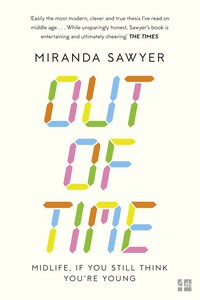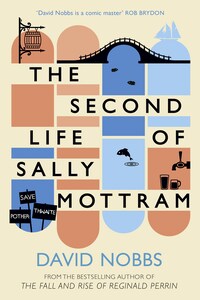4th Estate
An imprint of HarperCollinsPublishers
1 London Bridge Street
London SE1 9GF
www.4thEstate.co.uk
First published in Great Britain by 4th Estate in 2016
Copyright © Miranda Sawyer 2016
Miranda Sawyer asserts the moral right to be identified as the author of this work.
A catalogue record for this book is available from the British Library
All rights reserved under International and Pan-American Copyright Conventions. By payment of the required fees, you have been granted the non-exclusive, non-transferable right to access and read the text of this e-book on-screen. No part of this text may be reproduced, transmitted, down-loaded, decompiled, reverse engineered, or stored in or introduced into any information storage and retrieval system, in any form or by any means, whether electronic or mechanical, now known or hereinafter invented, without the express written permission of HarperCollins
Source ISBN: 9780007521081
Ebook Edition © ISBN: 9780007509157
Version: 2017-04-11
The start is always quiet. Even when the event is catastrophic, when it’s sudden and violent and crashes in, a meteor blazing from the sky to change everything you know – even then, what people say is: ‘It happened out of the blue. Everything was normal. Nothing seemed any different. It was a complete shock.’
When what is happening is gradual, when it seeps under the door, like water or smoke, then the start is even quieter. It’s silent. You don’t notice it at all.
Middle age is a time of settled status, when your achievements, your experience and your knowledge knit together to create sustenance and prestige, and you are taken seriously, valued as a high-contributing member of society.
‘You’re a smelly bum-bum,’ says F, my daughter. Her face is full of sneer and delight. ‘And when you die, I can have all of the sweeties that are in the tin up there. And I can go to Africa to see the funny cows that Miss telled us about. And I can have your shoes that are sparkly.’
We were talking about us not having a garden, about moving flat maybe, probably not. I was feeling frustrated.
‘But, you know, feelings aren’t facts,’ said my husband, S. He had been saying this a lot to me: ‘Feelings aren’t facts.’
What you feel is not what is actually happening here.
S is an emotional man, and he uses his mantras to reassure himself as much as me. He was right. The facts remained; they were unchanging. How I felt about them – how I feel about them – makes no difference. The sun rises, the day begins, the school opens, the children go out and then they come back, I work, ideas are sent off, plans are made, the plans succeed or they don’t, meals are eaten, and off to bed, and again, and again. Time passes, more quickly than you dare to think about.
These are the facts. I am in my forties. I have a job. I am married. We have children and a flat with no garden, and a mortgage and a fridge-freezer and a navy blue estate car. None of this is a surprise. Is it?
Except … a mood can gradually take over, change the way you feel about the facts. Warp them into something different. You know how it is to fall out of love with someone? How the simple reality of them walking into a room, or the way their teeth clink on a mug as they drink their tea can make you hate everything about them, even though they are the very same person you once found so bewitching? I did not feel this about my husband. I was wondering if I felt it about myself. About my life, and who I had become.
There were other feelings. A sort of mourning. A weighing up, while feeling weighed down. A desire to escape – run away, quick! – that came on strong in the middle of the night.
But the main feeling I had came in the form of a moving picture, a repeat action. I am standing in a river, the water flowing, cold and silver, bubbling and churning around my feet. It’s lovely, really lovely, and I’m plunging my hands in, over and over, trying to catch something. Have I dropped it? Is it a ring? Or was it a fish I wanted?
No. It’s the water itself. It’s so beautiful. I want to hold it in my palms, bring it up close, clutch it to my heart. I want to stop it rushing past me so fast.
A crisis sounds so thrilling. A breakdown. A revolution. A sudden change, institutional collapse. Something dramatic.
One that happens in your forties? Hmm. Less so. We all know what that is. We see the outward gesture – the new car, the extreme haircut, the unusually positioned piercing – and we smile. We patronize. Look how silly he is, in his baseball cap, on his motorbike, with his new lover on his arm. Not dashing, not carefree, not youthful. Sad. And see her, with her tragic attempts to slow time, the clothes that are too young for her, the organic diet, the new lips. Ridiculous. Laughable.








